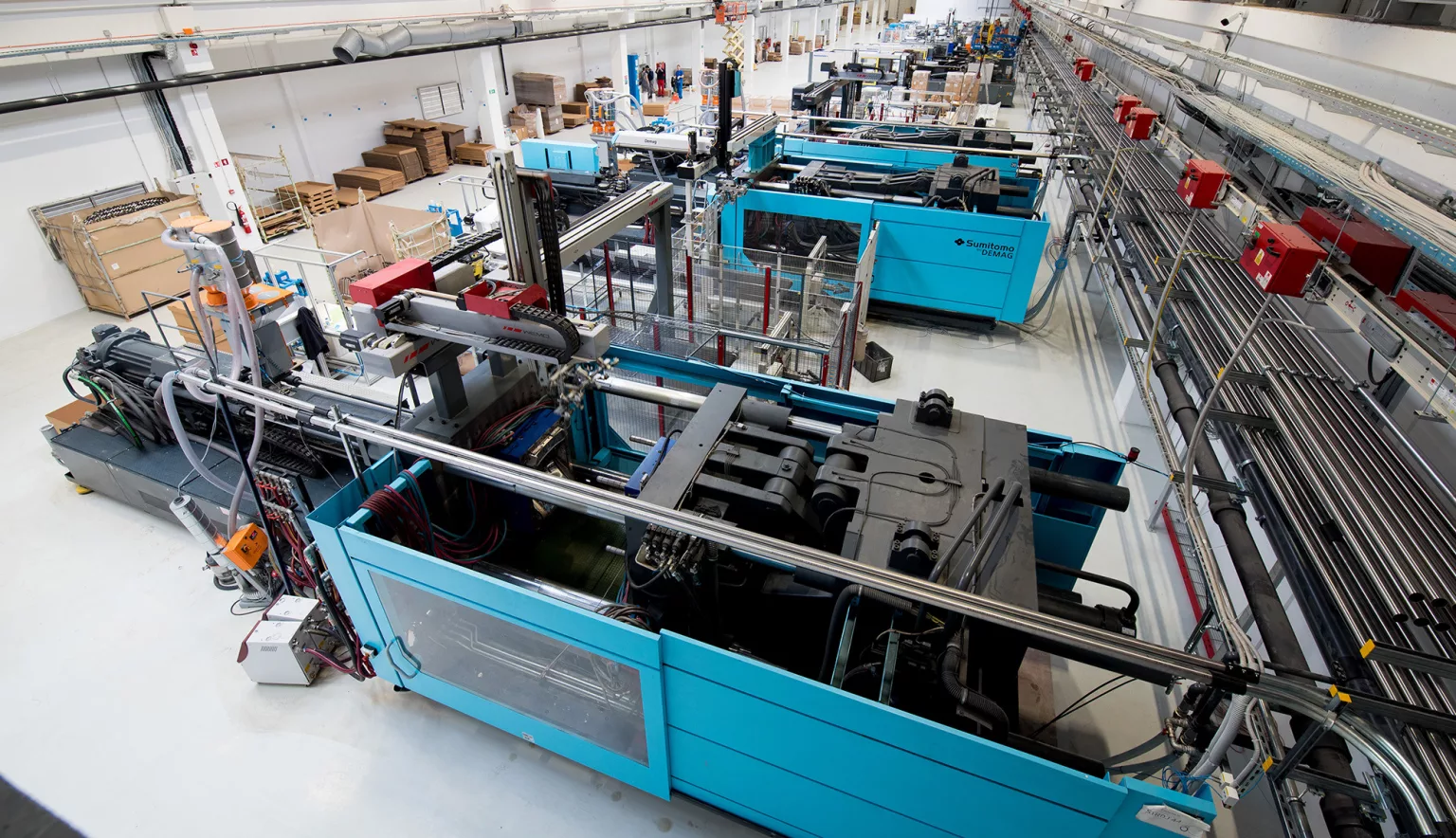Slovenia’s Plastika Skaza continues to pioneer new products, the company determined to drive a sustainable revolution in the plastics industry both at home and further afield.
PLASTIC GOES GREEN
When Belgian-American chemist Leo Baekeland created the first real synthetic, mass-produced plastic, Bakelite, in 1907, little did he know how dependent we would become on such products more than a century later.
Versatile, economical and lightweight, plastic has undeniably transformed the way we live both at home and in the workplace, its usage stretching from automobile parts to disposable takeaway containers. Such is its impact, today the global plastics market is worth more than $568 billion, growing steadily at around 3.2 percent a year.
But it has also caused problems. Overreliance and overconsumption of plastic products has created serious environmental harm, not least in the world’s oceans and rivers, where some items will take hundreds of years to decompose.
However, the tide appears to be turning. In Slovenia, Plastika Skaza is working tirelessly to innovate and educate on new, more sustainable plastic products, its Joint CEO Robert Agnic determined to change the narrative and perception of the industry.
“The long-term goal is to raise and change the perception of sustainability, both locally and globally, and to become the first face of plastic and sustainable development,” he tells us. “The area we work in is changing the perception of ‘virgin plastic’ and finding ways to reuse it, using a variety of technologies, knowledge and experience.
“It is an exciting space to be working in. The industry is changing, and we are constantly involved in these changes and developing projects. This year we were chosen as one of the 19 ambassadors of the national campaign for the promotion of the Slovenian economy, run by the public agency SPIRIT Slovenia under the slogan ‘I FEEL SLOVENIA. Green. Creative. Smart.’”
Agnic himself is something of green industry ambassador. He heads up the plastics platform within the Chemical Association of Slovenia, a body which is not only driving sustainable change at home, but also in cooperation with neighbouring Croatia and the Circular Plastic Alliance, a European Union circular economy initiative.
It has been a long-held passion and mission for the Joint CEO. “As a child, I enjoyed doing my own homemade experiments and research,” he recalls. “I further deepened my interest in chemistry and technology in high school, so one of the logical consequences was to extend my studies in this field.
“Before joining Plastika Skaza, I was already working in a sustainable-oriented company, so I wanted to continue this story in the future as well. In Plastika Skaza, I saw an opportunity to share and assert my ideas and vision and put them into a larger story.”
SUSTAINABLE AT HEART
And the story is one which started more than four decades ago in the north-eastern city of Velenje, sat in the rolling green hills of Slovenia’s Šalek Valley.
In 1977 Plastika Skaza began producing products in a what was effectively a garage. Fast-forward to today, and Skaza now designs and manufactures modern, innovative solutions made largely from biodegradable or recycled materials across electro, home and medical categories.
Its factory spans 15,400 square metres and is occupied by 280 staff who operate two core components of the business – contract manufacturing for external clients and production of its own branded plastic products.
The decision to make its own products was a relatively recent one, Skaza launching its in-house ranges five years ago. To date, it has sold more than 1.3 million items through its network of 600-plus stores in 17 countries around the world.
Central to its success? For Agnic, recent times have been all about the drive to serve an ever more environmentally conscious customer.
“Two years ago, we exited the automotive industry and focused on the electro, home and medical sectors,” he explains. “Since then, all our efforts have been focused on sustainable development. Our role as a partner is strategic and developmental – together we are constantly introducing new materials that are either recyclable, bio-based or biodegradable.
“A clear advantage we possess is the fact we have sales, development and quality departments within the company, which means that we are agile and quickly recognise the needs of the customer. The company is run by two CEOs, both experts in our own field, so we complement each other perfectly.
“We believe that our range of knowledge is wide enough to be able to react quickly to just about any change. In this way, we introduce new, modern management approaches, which is also important for the culture of the company and our employees.
“We know how to reach our objectives. We operate with a clear focus. We are courageous. We dare to be different. We have knowledge and love to share it!”
The company is also clearly motivated to take on new challenges, especially in the way it seeks to make use of new and complex materials. For example, it has developed a plastic from hand-picked and recycled fishing nets, items which may otherwise have been discarded and caused harm to land and marine life.
This will be used to make a brand-new range of kitchen composters under the Bokashi Organko 2 Ocean brand. Set for launch in October, Skaza is already taking pre-orders for what is a world first on the market.
Further, not only is there a relentless drive to introduce more sustainable materials into its products, the energy that powers the Skaza operation is derived entirely from renewable sources. This contributes towards the company’s bid to power a circular economy, with Agnic explaining that the firm’s goal is to catalyse positive change across three major strands – environment, community and employment.
“Our mission is to change the habits of people and with that preserve the planet,” the Joint CEO says. “We operate in accordance with the principles of sustainable development.
“We steer innovation towards solutions that are friendly to people, communities and nature, and contribute to the development of green technologies. Our success is connected with socially responsible projects and the principles of our operation are a source of added value and competitive market recognition.”
CHANGING THE NARRATIVE
Success through 2020 has, by Agnic’s own admission, been difficult to sustain.
The onset of the global coronavirus pandemic has disrupted operations at Plastika Skaza, with many sales and orders being pushed back. However, the Joint CEO is proud of the fact that the company has been able to partially plug the gap with new customers, a sign of the firm’s agility which will serve it well in the future.
Agnic also pays tribute to Skaza’s robust and highly valued supply chain network, its partners helping it to hold firm through what have been challenging times.
“The goal of our customers is our goal as well,” he adds. “What our customer wants, is our focus. We understand our customers and maintaining good partnerships is one of our most important priorities.
“This was especially noticeable during the COVID-19 crisis, when suppliers stood behind us with smooth procedures, communication, and together we managed to overcome the problems. When the crisis hit, we made a commitment to our customers to work with all the safety measures necessary and coordinated it with them.”
And looking ahead, Plastika Skaza’s message is clear. Agnic emphasises that the company is ready to support any prospective client that is looking to transform sustainably, and partner with those firms of a similarly sustainable mindset and with goals to transform society for the better.
Indeed, the number of what Agnic calls major partners has grown by 20 percent this year, a trend which will be reflected in Skaza’s financial performance in 2021. The Joint CEO also highlights plans to acquire an in-house tool shop by the end of 2020, another move which will lead to greater efficiencies and an all-round more sustainable operation.
Such developments leave Agnic optimistic about what lies ahead as he concludes the conversation. Outlining his vision, he says: “In 2021, our goal is to expand our work in the medical industry and win new sustainable partners.
“The aim is also to raise the added value of the final item sold, which means we will do a lot of things internally that will result in less movement and reduced carbon footprint.
“When preparing offers, we want to increase the percentage of bio-based and recycled materials. In this way, we will constantly challenge ourselves to develop new materials with our partners – of course, with those partners who want this change too.”






























